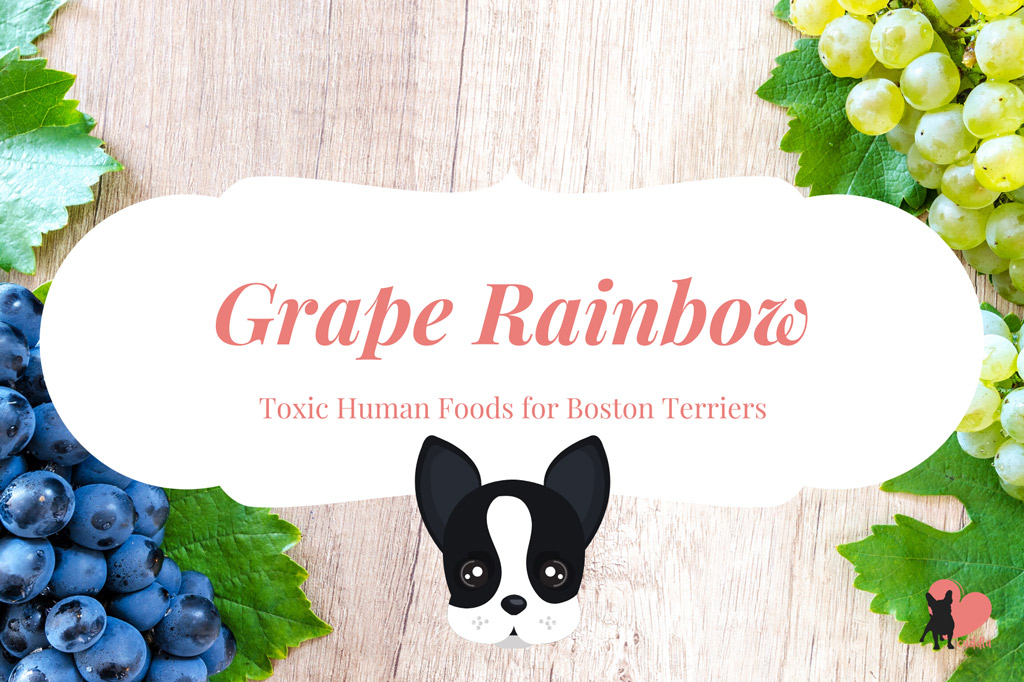
Dogs and humans metabolize foods differently. That’s why some foods that are safe for us can be toxic to dogs.
Chocolate is an obvious no-no for many dog owners. But what fruits Boston Terriers can and cannot eat can be daunting.
For example, can a Boston Terrier eat grapes? The answer is NO. You should never feed your Boston Terrier grapes or raisins (dried grapes).
In Can a Boston Terrier Eat Apples? 10 Other Safe Human Foods blog post, I listed which human foods are safe for Boston Terriers. Here, I will list toxic foods and possibly harmful ones too.
Can a Boston Terrier Eat Grapes?
Boston Terriers cannot eat grapes. Just one or two grapes, which is a small amount, can lead to serious illness or even death in some dogs.
Can Boston Terriers eat raisins instead?
Raisins are dried grapes, so they are also dangerous. They are even more harmful because they have a higher concentration of the toxin.
Vitis vinifera fruits, including grapes, raisins, sultanas and currants are toxic for dogs.
The active ingredient which causes the toxin is unknown. Studies have ruled out pesticides, heavy metals, and fungi as the toxic factors.
The main consequence is sudden, acute kidney failure. These four fruits may also cause severe liver damage.
Disclaimer:

I am not a veterinarian, so always check with your vet before changing your Boston Terrier’s diet to avoid unexpected consequences.
However, I do have knowledge on dog nutrition and dietary needs.
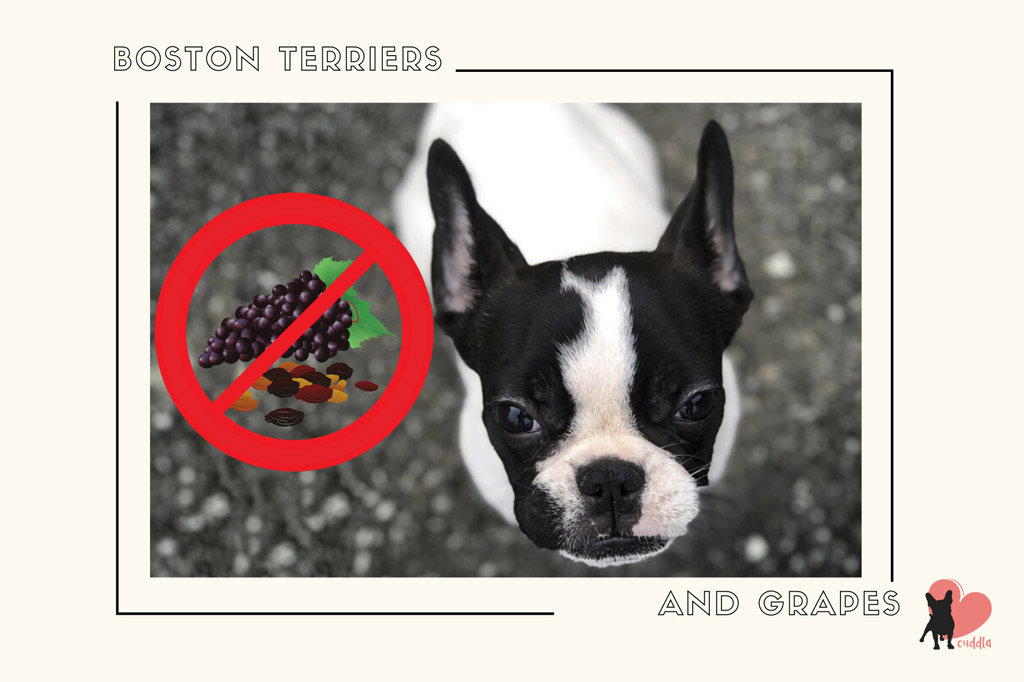
What Should I Do If My Boston Terrier Eats Grapes?
If you see your Boston Terrier eating some grapes, the best thing to do is to take your pooch your veterinarian to induce vomiting.
Even if all dogs don’t react the same to grapes or raisins, you should seek help immediately.
If you cannot get hold of your vet, here are some alternatives in the US:
- Pet Poison Helpline – talk to an expert (855) 764-7661 ($59 USD per incident fee applies).
- ASPCA Animal Poison Control Center – (888) 426-4435 (a consultation fee may apply).
Can Grapes Kill Dogs?
One grape or raisin is not a cause of alarm, although you should keep an eye on your Boston to make sure that he’s fine and doesn’t show any poisoning symptoms.
“Your Boston Terrier should be in no danger from eating just one grape.”
Dr Scott Nimmo, veterinarian.
However, larger amounts of grapes or raisins are a cause of concern.
The ASPCA Animal Poison Control Centre studies suggest that the lowest documented toxic dose was 10 to 12 grapes in a 20 pound (9kg) dog.
“The documented toxic grape or raisin dose range is 0.32 to 0.65 oz/kg (0.15 to 0.32 oz/lb). This means a 20 pound dog can eat as little as 3.2 ounces and have signs of toxicity. Studies suggest the lowest documented toxic raisin dose is 0.1 oz/kg and 10 to 12 grapes in a 20 pound dog. Raisins are 4.5 times more concentrated than grapes on an oz per oz basis.”
Dr Debra Primovic.
If untreated, within just a few days, dogs have experienced kidney failure, lapsed into comas, and died from eating grapes.
What Are the Symptoms of Grape Poisoning in Dogs?
Purple or green, seeded or seedless, it doesn’t matter.
Depending on the individual dog, within mere hours of ingesting grapes or raisins, a dog can experience an adverse reaction.
The poisoning symptoms in dogs generally can start within a few hours and progress over 24 to 48 hours.
Some dogs suffer from vomiting (often within 2 hours of ingestion) and diarrhoea as their bodies try to purge the poison. This will result in lethargy and dehydration.
As the disease progresses into kidney failure, you may see the following:
- Lack of appetite.
- Increased lethargy.
- Vomiting.
- Depression.
- Diarrhoea.
- Increased urination.
- Abdominal discomfort.
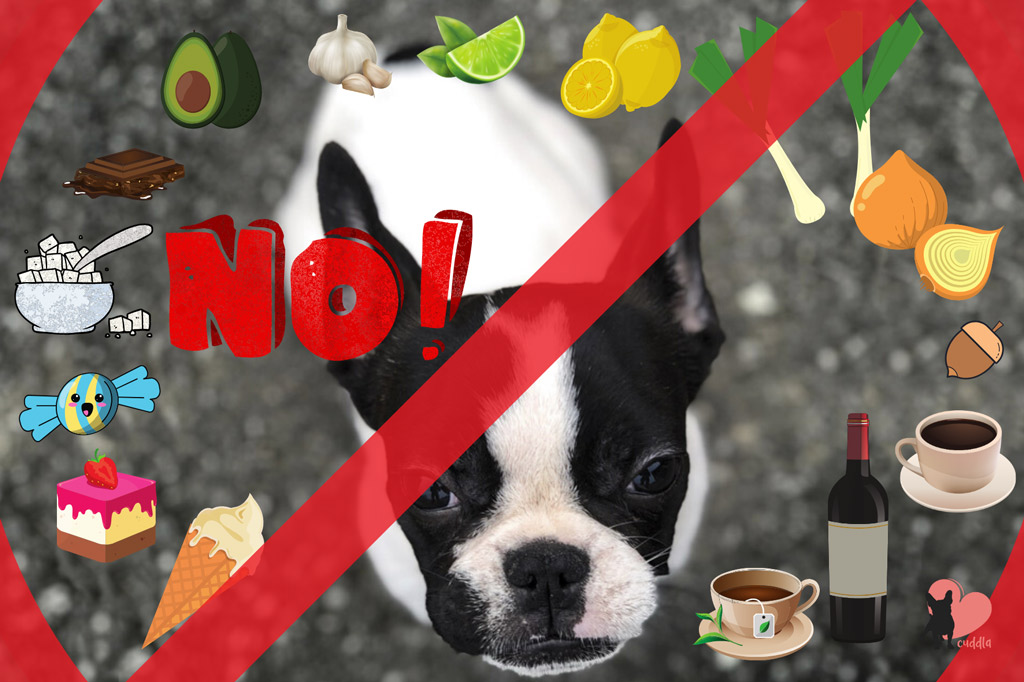
10 Toxic Foods for Boston Terriers
Dogs can be opportunists when it comes to getting their paws on tasty treats. Once I found my cat’s head deep inside my mug and our family Yorkie, who jumped onto the dining table, about to devour a homemade cake!
Not all everyday foods and drinks are safe if our pets come into contact with them. i.e. You can never be too careful with your furry friend!
According to ASPCA‘s toxin list, food is the third most common reason for dog poisoning. (Find about the rest in 7 Other Toxic Substances for Boston Terriers section below).
Most cases involve food or ingredients such as xylitol, grapes, raisins, onions and garlic.
P.S. For healthy and safe food alternatives, check our 10 Safe Human Foods list.
Based on “Household Food Items Toxic to Dogs and Cats” study, here are 10 toxic human foods for Boston Terriers:
#1 – Chocolate and Chocolate-Based Products
Chocolate is irresistible for both humans and pets. However, chocolate is toxic to dogs, chocolate-based products included.
It contains theobromine and caffeine, dark chocolate having the highest content of them. Dogs cannot efficiently metabolize these two stimulants, which can cause kidney failure.
Even if it’s well known that chocolate is dangerous for dogs, it’s, unfortunately, one of the top common causes of dog poisoning…
The presence of chocolate was noted in the 10 most common cases of toxicosis involving dogs reported to the VPIS and to the American Society for the Prevention of Cruelty to Animals (ASPCA), Animal Poisons Control Center (APCC) in the past few years.
#2 – Sugar and Xylitol
All types of sugar and artificial sweeteners, including xylitol, are harmful to your Boston Terrier.
Xylitol is a sugar substitute that is widely used in drinks, sugar-free products, candy, chewing gum, baked goods and toothpaste, for example.
When dogs consume xylitol, it may lead to a rapid drop in blood sugar levels known as hypoglycemia. This can lead to liver failure and blood clotting disorders.
Common symptoms of xylitol poisoning include muscle weakness and seizures.
#3 – Onions
Plants containing allium, including onions, garlic, leeks and chives are toxic to dogs. All components and forms of onions are harmful to dogs: leaves, juice and processed powders.
Dogs highly susceptible to Allium toxicosis and the ingestion of 15–30 g/kg by dogs is enough to cause clinically important hematologic changes.
The onion family is particularly toxic. Signs of illness are not always immediate and can occur up to a few days later.
It can cause gastrointestinal irritation and red blood cell damage, reducing their ability to carry oxygen through the body. This often results in a condition called anaemia.
#4 – Garlic
Garlic also contains allium, like onions, so it’s also poisonous for dogs.
It causes the same effects as onions when ingested. Garlic may also lead to symptoms like vomiting and diarrhoea in dogs.
However, other experts claim that dogs can safely consume 1/4 teaspoon of freshly chopped garlic per 15 pounds of body weight.
Garlic has important health and nutrition benefits:
- Health properties: Antibacterial, immuno-stimulant, anti-cancer, nutritive, antioxidant, expectorant, hypotensive, anti-tumour, anti-viral, anti-fungal and tonic qualities.
- Nutritional properties: Protein, fibre, phosphorus, potassium, vitamin A, iron, thiamin, niacin, taurine, zinc, riboflavin, magnesium, manganese, calcium, zinc, and selenium.
#5 – Avocado
Avocados are another poisonous food to Boston Terriers.
They contain a substance called persin, which is in its leaves, fruit, and seed. This substance can cause vomiting and diarrhoea.
It may lead to fluid accumulation in their lungs and chest, which can cause breathing difficulties, oxygen deprivation and even death.
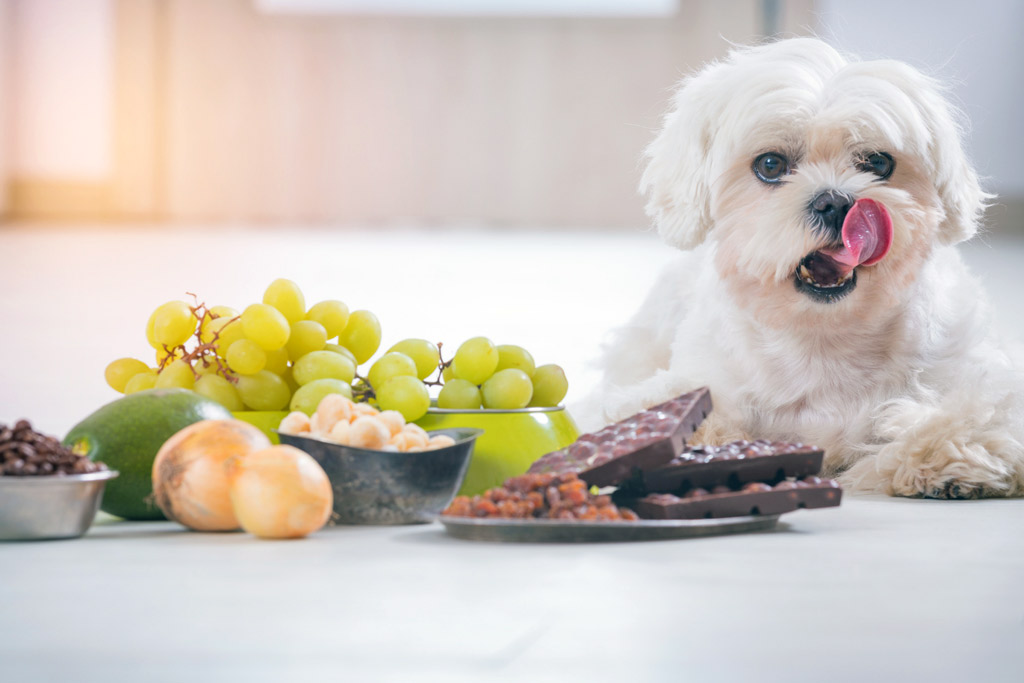
#6 – Macadamia Nuts
Boston Terriers should never eat macadamia nuts.
They contain a toxin that can affect your dog’s muscles and nervous system resulting in weakness, swollen limbs and panting. It may also lead to vomiting, tremors, hyperthermia and depression.
What about other types of nuts?
Dogs can only eat peanuts, cashews and almonds when they are raw (not roasted or salted) in very limited quantities. Most nuts are high in fat; they can contribute to weight gain and pancreatitis in dogs.
#7 – Lemons and Limes
Both lemons and limes can be toxic to your dog. The fruit is edible, but the skin and plant cause problems.
This is because the skins of lemons and limes contain a substance called psoralen, which can cause vomiting, diarrhoea and potential dermatitis in dogs.
#8 – Alcohol and Ethanol
Boston Terriers should never consume alcohol, in particular, ethanol.
Consuming even small amounts of it may lead to ethanol poisoning in dogs. Alcohol not only causes intoxication as it does in humans, but it can lead to sickness, diarrhoea, vomiting and seizures.
If a dog consumes too much alcohol, it can result in more severe symptoms, such as heart attack, lung failure, coma and even death.
Insider Tip: Apart from alcoholic beverages, ethanol can be found in a variety of products, such as paint and varnish, cleaning products, medication, perfume, mouthwash, and antifreeze.
#9 – Coffee and Tea
Coffee, tea and soft drinks are dangerous for dogs because they contain caffeine.
Small amounts of caffeine are enough to stimulate your dog’s nervous system. This causes adverse effects like hyperactivity, vomiting, diarrhoea, elevated heart rate, seizures and tremors.
In extreme cases, it will lead to lung failure, abnormal heart rhythm, and ultimately death.
#10 – Nutmeg
Finally, nutmeg is not safe for dogs to eat. You can find nutmeg in pastry and cakes. So, prevent your Boston from consuming any baked goods that contain nutmeg (and other harmful ingredients like sugar).
Nutmeg contains myristicin, a compound that is toxic to dogs when consumed in large amounts. It may cause disorientation, increased heart rate, high blood pressure, dry mouth, stomach pain and seizures.
15 Possibly Harmful Foods for Boston Terriers
Since Boston Terriers suffer from allergies also caused by food, always check with your vet before feeding your pooch human foods.
Also, your Boston Terrier’s diet doesn’t need to include the same food we eat for it to be balanced and healthy for your dog.
There are other human foods that are labelled as “can eat” or “limit” that are possibly harmful to BostonTerriers.
Let’s see which ones and why!
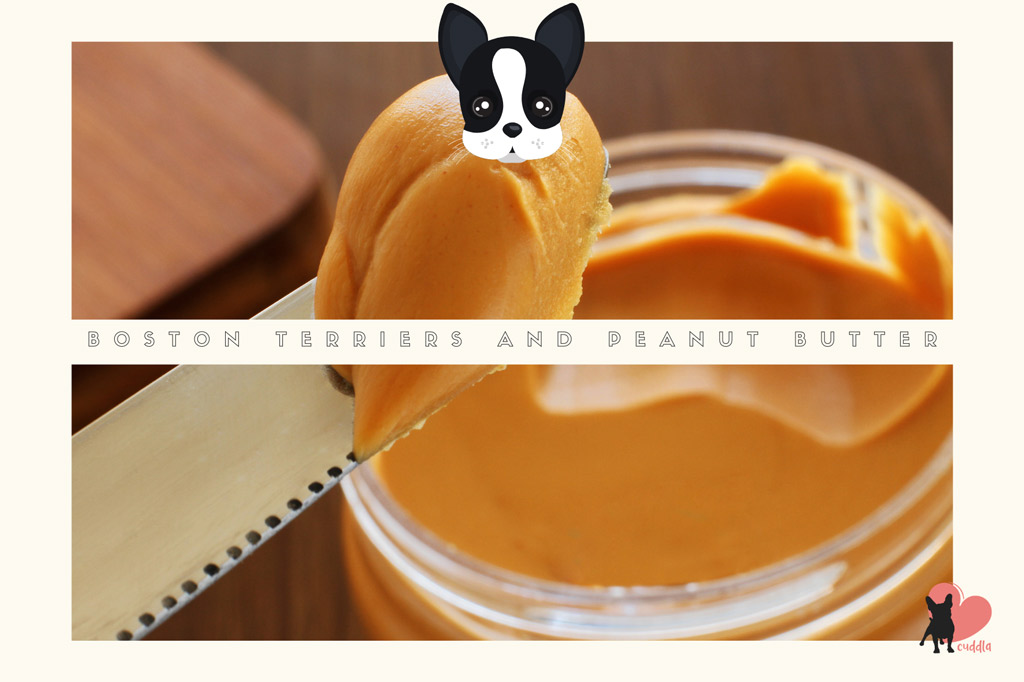
#1 – Peanut Butter
Can Boston Terriers eat peanut butter? Peanut butter is a controversial one.
If peanut butter contains sugar or xylitol, it’s definitely toxic to your dog. Otherwise, dogs could eat peanut butter with limitations for three reasons:
- Peanuts contain aflatoxins, a cancer-causing substance that is also toxic to the liver.
- Their fats are not balanced. They contain way more omega-6 fatty acids than omega-3 fats. This can lead to inflammation and weight gain in dogs.
- Commercial peanut butter has extra ingredients, including added salt, which could be harmful to your Boston.
Read also: Can a Boston Terrier Eat Peanut Butter? 3 Things To Know to avoid possible allergies.
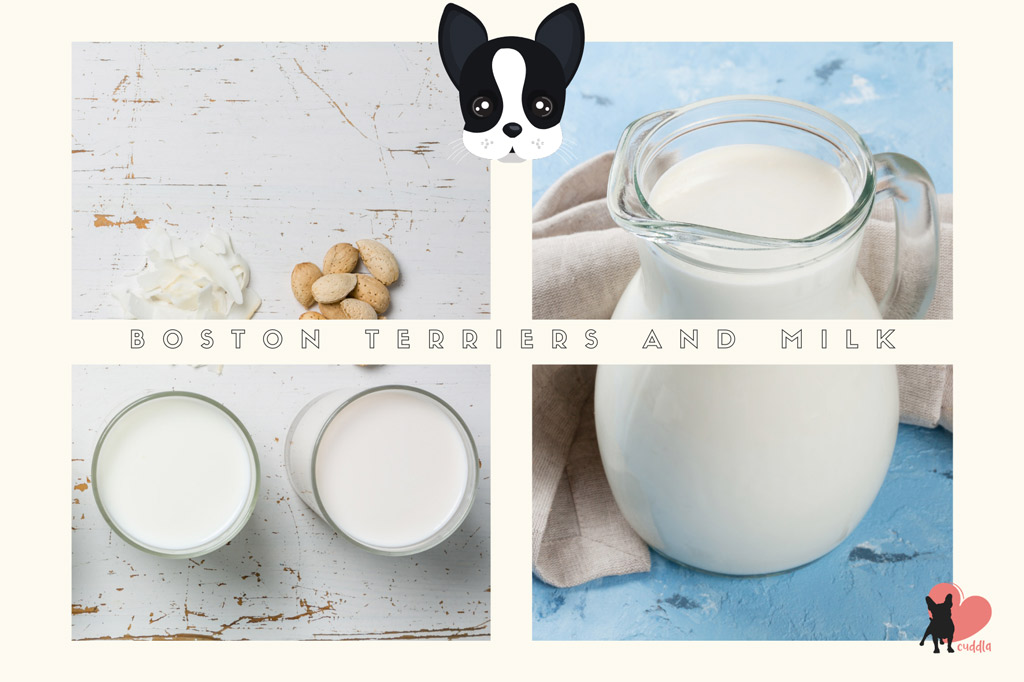
#2 – Milk
Can Boston Terriers drink milk?
Depending on if they are lactose intolerant or not.
Once puppies have been weaned, they can become lactose intolerant since they will produce less lactase.
“Milk contains a sugar called lactose that requires an enzyme called lactase for digestion. Puppies generally have the enzyme in abundance as it is used to breakdown their mother’s milk while nursing.”
Dr Heather Brausa, staff doctor at NYC’s Animal Medical Center.
If your pooch is lactose intolerant, he can experience symptoms like:
- Loose stools.
- Gas.
- Vomiting.
- Abdominal pain.
- Diarrhoea.
Also, milk and dairy products are common triggers for food allergies in dogs (source). This causes irritation of the skin, redness, itching and an upset GI tract (resulting in vomiting and diarrhoea).
Regardless if a Boston Terrier is lactose intolerant or not, dogs don’t digest cow or goat milk well. So you should avoid or limit your dog’s ingestion of milk. Milk has more negative effects than positive effects on dogs, so personally I don’t give it to dogs.
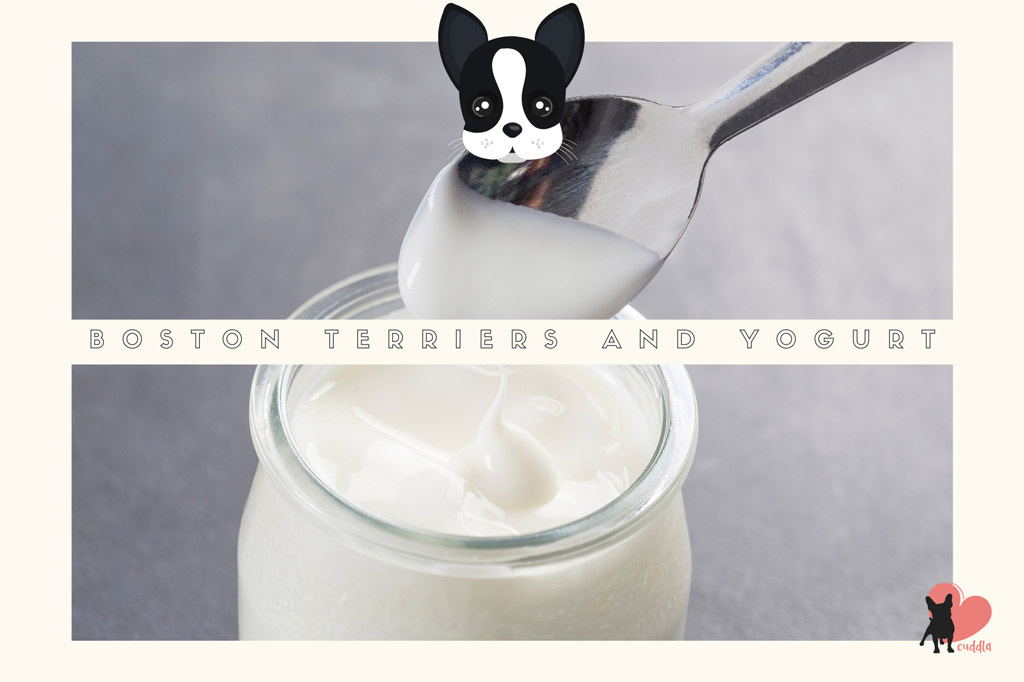
#3 – Yogurt
Can Boston Terriers eat yogurt?
Since yogurts contain milk, again it depends on your dog’s tolerance to dairy products. However, dogs can only eat yogurt in small quantities now and then.
Although yogurts are a source of calcium and protein, they also contain sugars, sweeteners and other ingredients that are harmful to dogs.
An alternative is kefir, a fermented dairy product. But, again, you should have a look at the ingredients first before feeding it to your pooch.
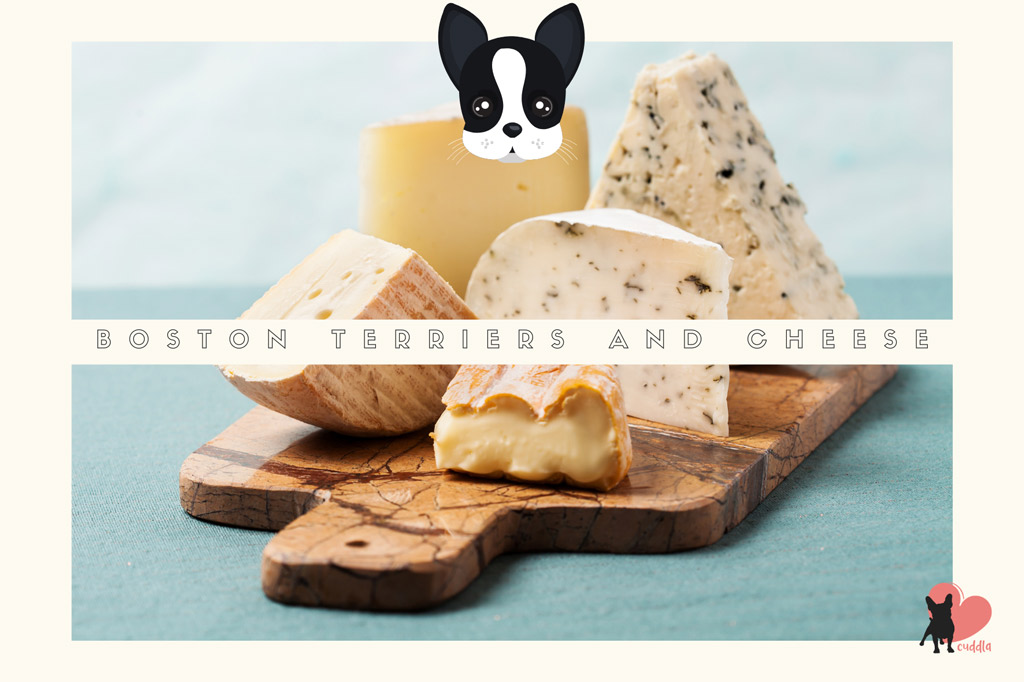
#4 – Cheese
Can Boston Terriers eat cheese?
Boston Terriers who aren’t lactose-intolerant can eat cheese in smaller quantities and only occasionally.
However, cheese is high in fat (not the healthy omega-3s) and lactose, which are not good for your dog’s digestion and health. Your dog can experience digestive symptoms such as stomach pain and diarrhoea after eating cheese.
Plus, cheese can be high in salt, which is also not good for your Boston. So, even if your pooch could eat it, cheese doesn’t provide any health benefits.
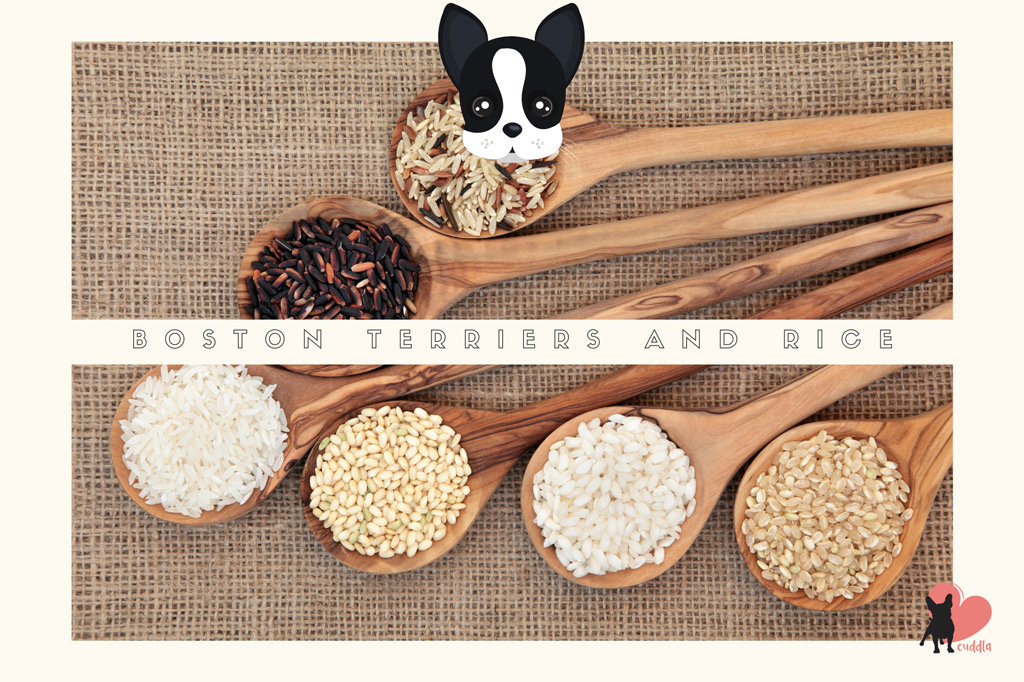
#5 – Rice
Can Boston Terriers eat rice? Dogs can eat cooked brown or white rice.
However, rice (like pasta) is a carbohydrate, which equals sugar. Remember that a dog’s diet needs to be low on carbs and high on proteins.
Many commercial foods use rice and potatoes as filler ingredients. They will make your dog feel full but they provide little nutrition.
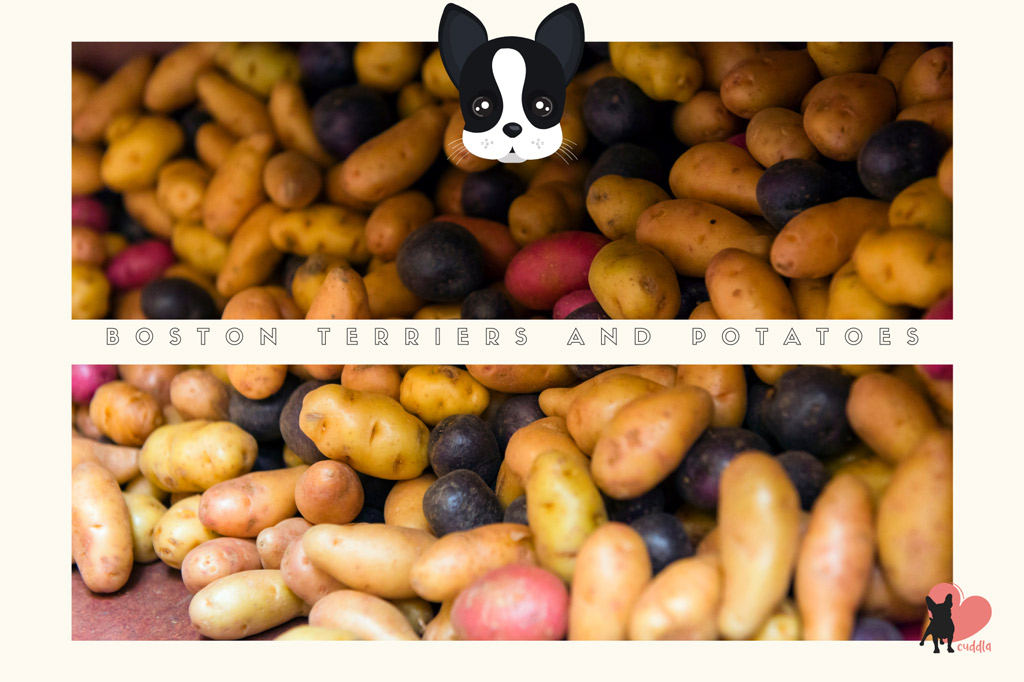
#6 – Potatoes
Can Boston Terrier eat potatoes?
Dogs can eat boiled and baked potatoes (white and sweet potatoes) in small amounts. However, raw potatoes are toxic to dogs because they contain a toxic compound called solanine.
Cooking potatoes reduces their solanine levels (source). However, boiling or baking potatoes increases their glycemic index (the sugar levels).
- Boiled sweet potatoes have a GI index of 63 (medium level).
- Boiled white potatoes have a GI index of 78 (high level).
- Raw sweet potatoes have a GI index value of 41 (low level).
White and sweet potatoes are a common ingredient in dog food and treats. Although rich in vitamin A and manganese, potatoes pose three problems:
- A higher amount of sugar. They are in high carbohydrate content. They will spike blood sugar in your Boston Terrier when he eats them. Also, they cause weight gain and inflammation in dogs.
- A growth of bad bacteria and yeast in your dog’s gut. This can lead to itching.
- Bone problems and muscle weakness in dogs due to an excess of vitamin A. Another reason not to feed big amounts of sweet potatoes.
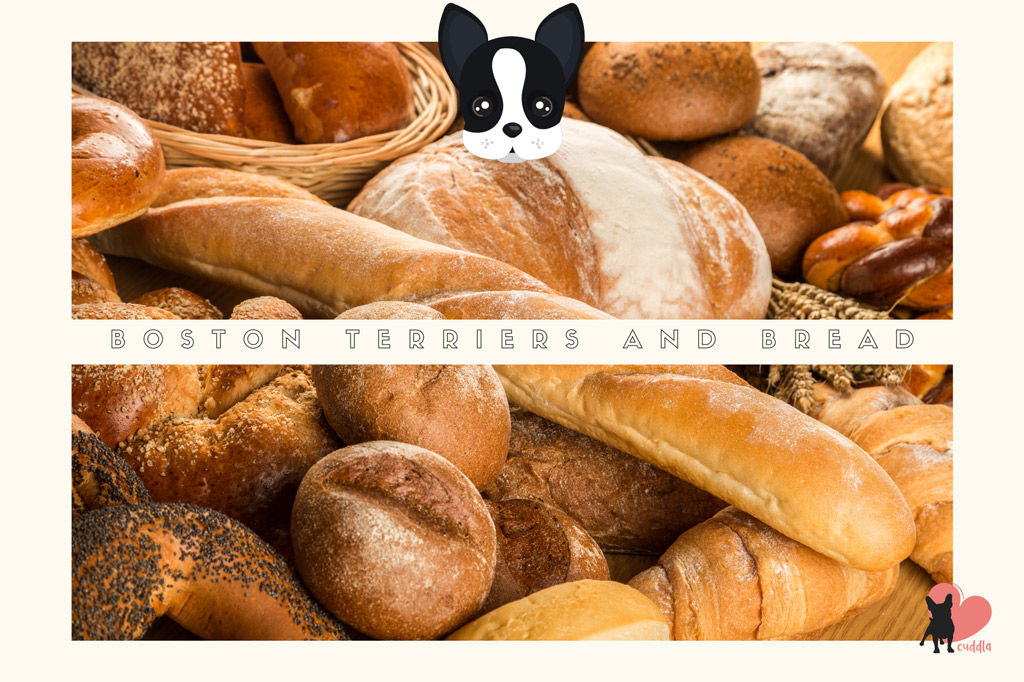
#7 – Bread
Can Boston Terriers eat bread?
White or whole grain bread is safe for most dogs to eat as an occasional treat. However, make sure it doesn’t contain any extra ingredients, such as raisins, which could be potentially harmful.
Although dogs can eat bread, this food only contributes to weight gain in dogs. Plus, wheat (a cereal grains used to bake bread) causes food allergies in Boston Terriers.
So, it is best to eliminate it from your dog’s diet.
Grains found in bread are not an essential ingredient for your Boston Terrier’s nutritional needs. A dog’s diet should include animal proteins, omega-3 fats, some green vegetables, vitamins and minerals.
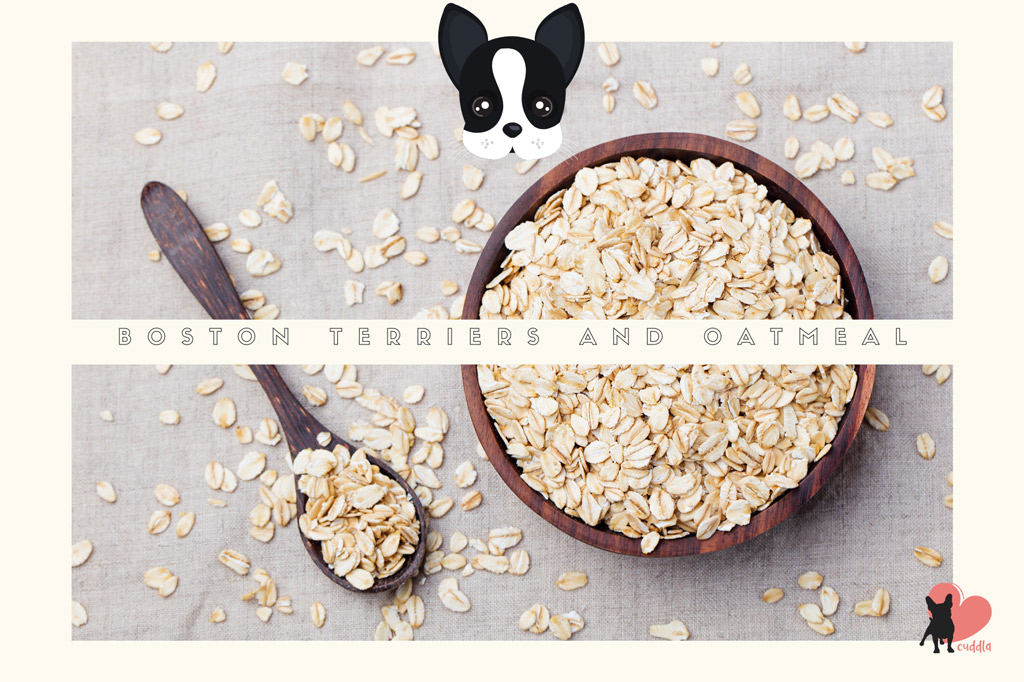
#8 – Oatmeal
Plain oatmeal is safe for your dog to eat with limitations.
Oatmeal is a source of fibre and some minerals (source). However, oatmeal is also high carbs, which causes problems like inflammation, weight gain and sugar spikes.
Boston Terriers can also experience allergies due to grains like oatmeal (as I mentioned above). Boston Terriers do better on a grain-free, gluten-free diet.
Insider Tip: Vegetables like broccoli, carrots and pumpkin seeds can provide fibre instead of grains like oatmeals. Bananas are also high on dietary fibre.
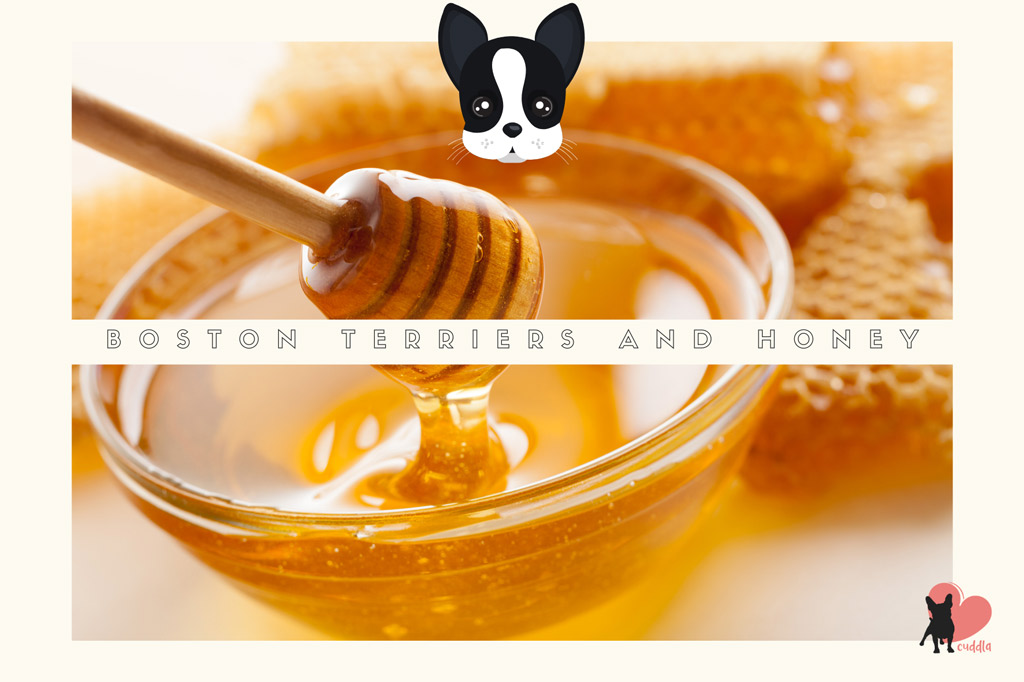
#9 – Honey
It is only safe to feed honey to your dog occasionally and in limited amounts.
Honey is high in sugar and calories, which contributes to weight gain (source). So, it’s best to avoid giving honey to your Boston Terrier.
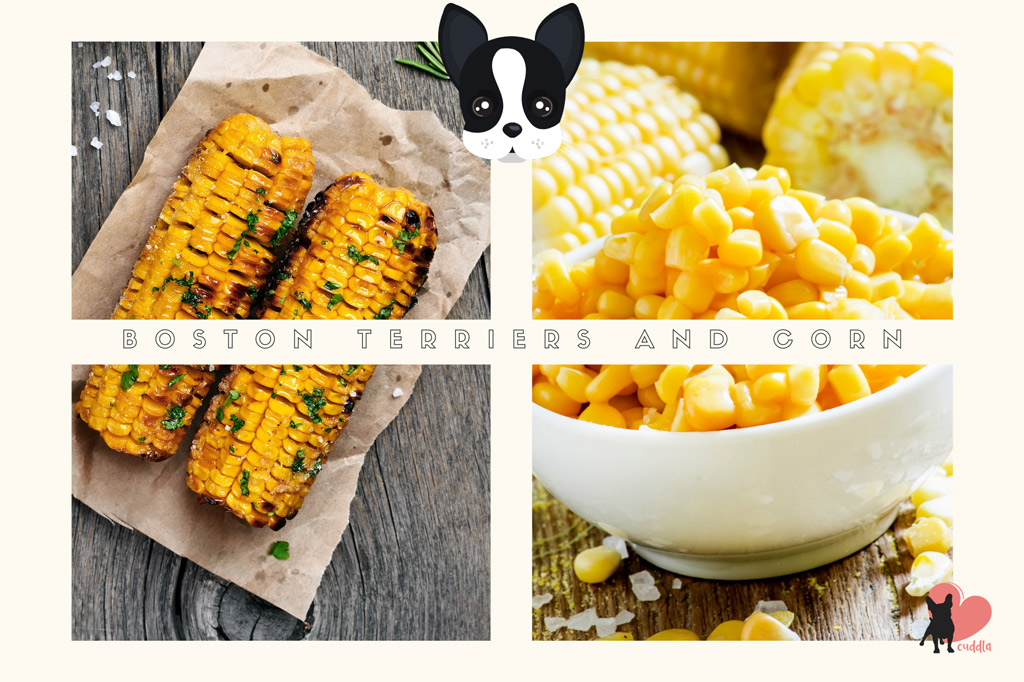
#10 – Corn
Dogs can eat corn in moderate amounts. However, corn, soy and wheat are among the known potential causes of food allergies in Boston Terriers. So, you probably want to avoid feeding it to your pooch.
Corn is a common ingredient in many types of dog food. It’s mostly used as a filler since it doesn’t have a high nutritional value.
Insider Tip: Corn on the cob could potentially be fatal for dogs. The cob can cause a blockage in your dog’s intestine.
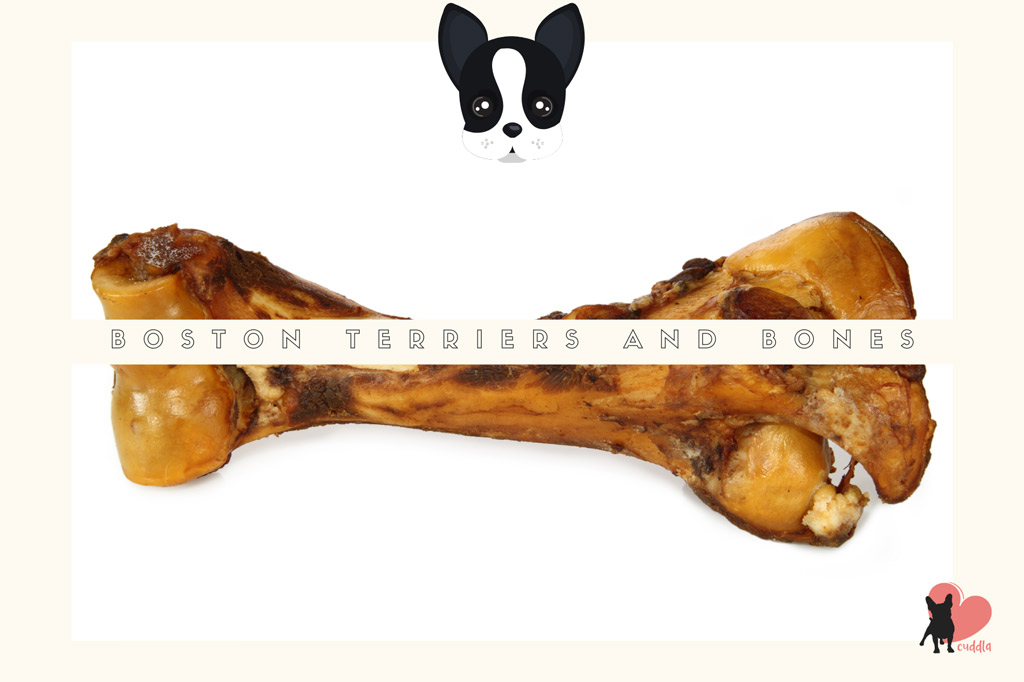
#11 – Bones
Can Boston Terriers eat chicken bones?
Dogs can eat bones as long as they are raw (not cooked) and the right size for their jaw. What’s more, they should be eating 12% bones as part of their daily diet (15% for puppies).
Bones are a high source of calcium and phosphorus, which are essential for dogs, especially puppies.
Also, chewing on bones have other benefits like being:
- A muscle-building activity.
- A natural teeth cleaner – it removes plaque and tartar from your Boston Terrier’s teeth and freshens his breath.
- An exercise and entertainment activity for your pooch.
Poultry bones (from chicken and turkey) are easier to chew than beef bones (which are harder and also bigger). Plus, bones get harder as they dry.
Source your raw chicken or beef bones, for instance, from a reputable butcher. Make sure that they come for pastured animals (grass-fed and grass-finished). Commercial options include Pet ‘n Shape Beef Bone – medium size.
However, feeding bones to your Boston Terrier can have it’s risks (source):
- Cooked bones splinter, harming your pooch internally.
- Raw bones can carry bacteria like salmonella (so clean the bowl or feeding area afterwards).
- Raw bones can also spoil in a few days if not eaten (remove them by the end of the day and discard them).
- Bones need to be the right size for your pooch; otherwise, they can become a choking hazard or can break their teeth.
- Raw bones can pose digestive problems for those Boston Terriers that don’t follow a raw diet.
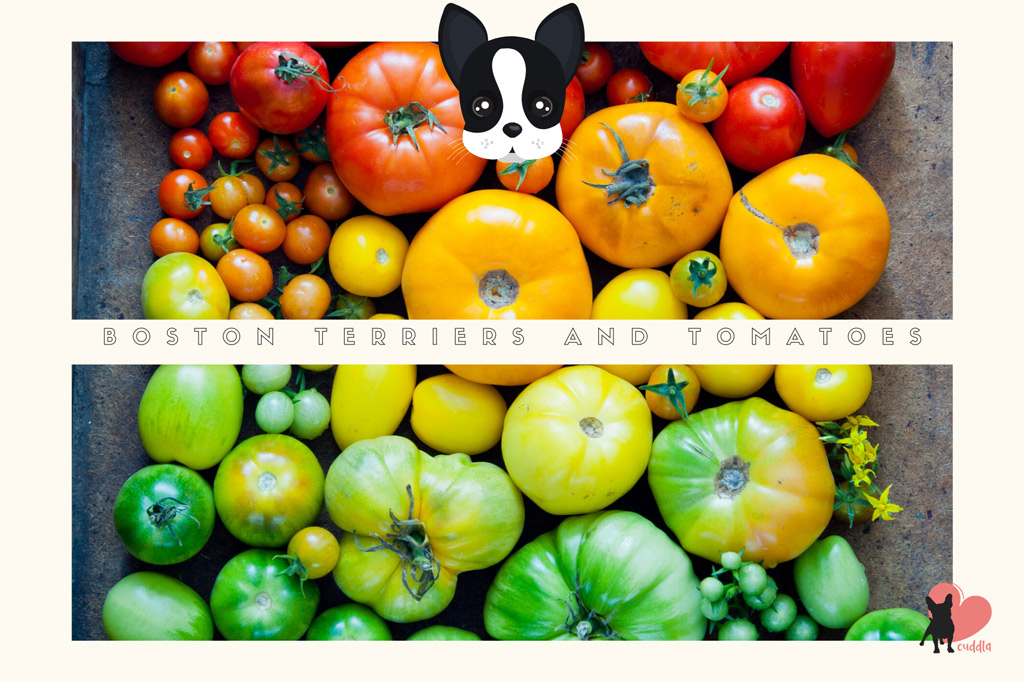
#12 – Tomatoes
Your Boston Terrier can eat tomatoes as an occasional treat, as long as they are ripe.
Green tomatoes, on the other hand, may contain small amounts of tomatine, a toxic substance for dogs (source).
Dogs that eat too much tomatine from tomatoes may experience nausea, an abnormal heart rate, muscle weakness and difficulty breathing.
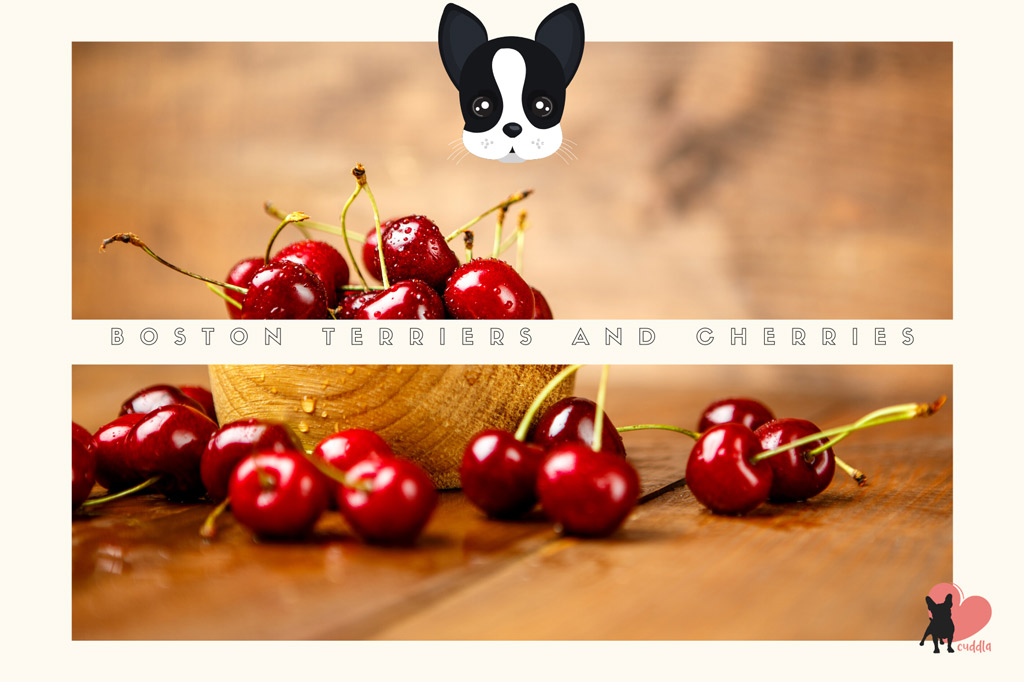
#13 – Cherries
Boston Terriers can eat cherries without pits with limitations (one or two cherries from time to time).
Cherry pits, like grape seeds, contain cyanide. This substance is poisonous to dogs when consumed in large amounts. Plus, cherry pits are a choking hazard.
If your pooch eats too many cherries, they will cause an upset stomach and diarrhoea in dogs if they eat too many.
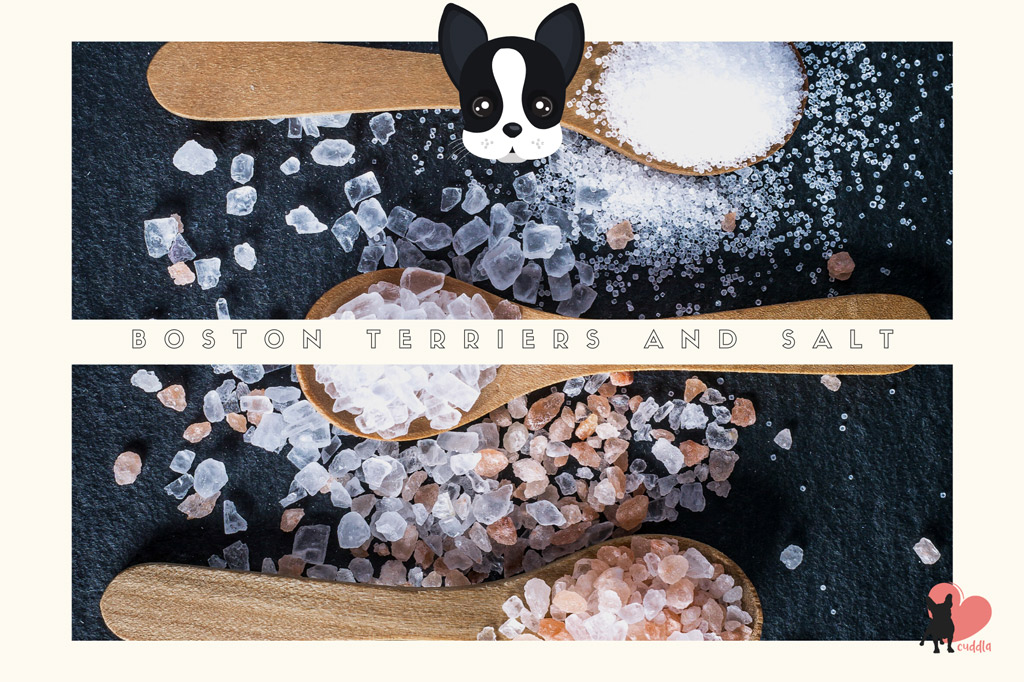
#14 – Salt
Salt should be limited in your dog’s diet.
Excessive salt intake leads to salt poisoning or water deprivation in dogs. As a result, your dog may suffer from vomiting, diarrhoea, and seizures.
To prevent adverse effects, avoid feeding your Boston Terrier salty foods or adding salt in his homemade meal.
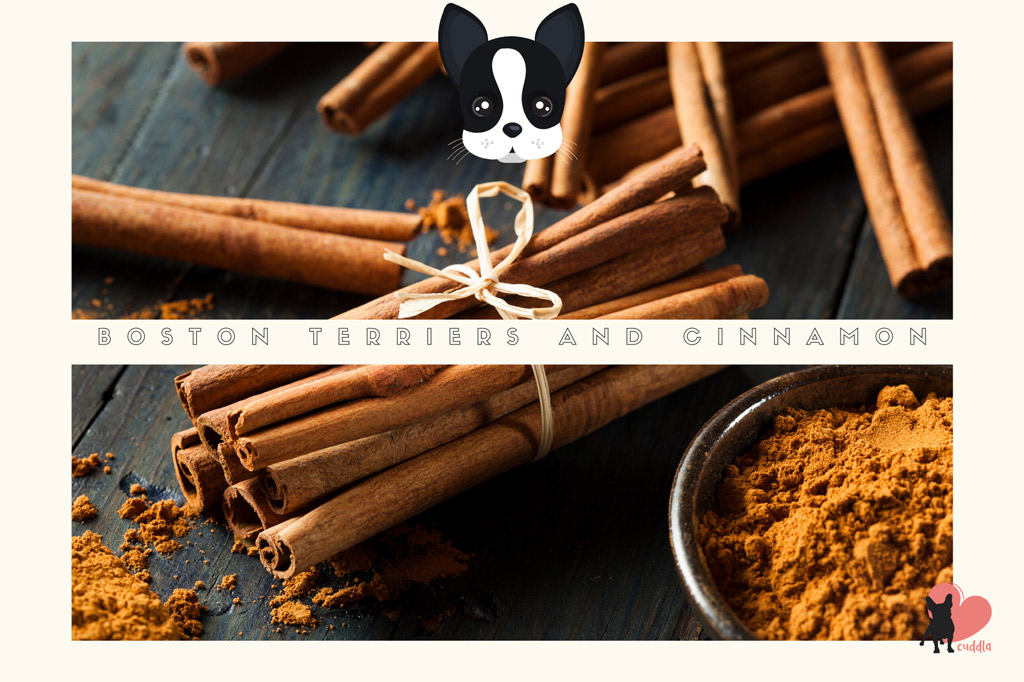
#15 – Cinnamon
Cinnamon is non-toxic to dogs, but you should limit it. This includes foods that contain cinnamon as an ingredient, such as baked goods.
Large quantities of cinnamon can irritate your dog’s mouth and digestive system. Plus, inhaling cinnamon powder may cause coughing, choking and breathing difficulties in your Boston Terrier (source).
Read also: What Do Boston Terriers Eat?
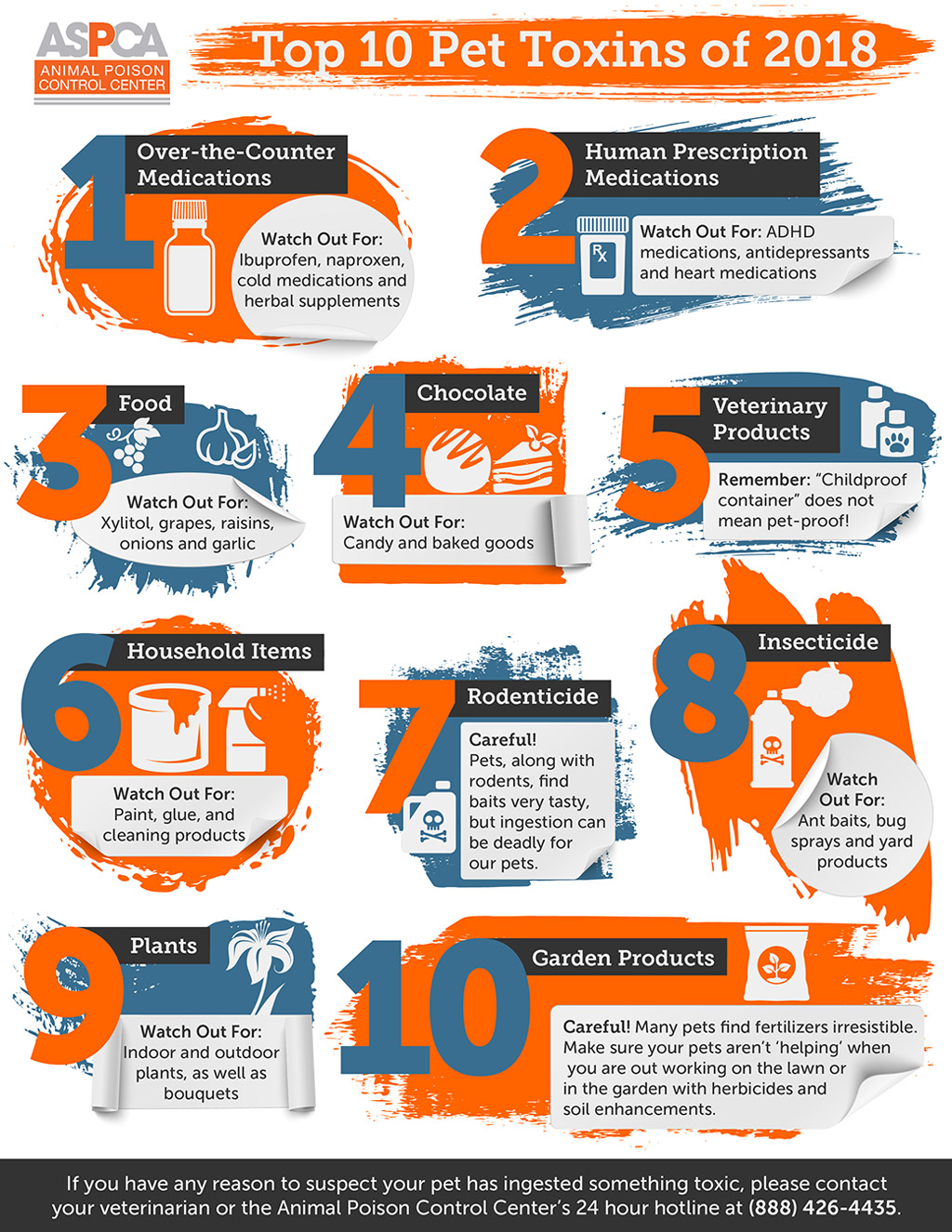
7 Other Toxic Substances for Boston Terriers
Apart from food, there are other substances in our home and garden that are dangerous for dogs:
- Medications: This includes over-the-counter and human prescription medications. From Ibuprone to heart medications!
- Veterinary products: These are accidental or unintentional exposures to pet medications.
- Household items: Apart from all cleaning products, paints and glue are also dangerous.
- Rodenticide exposure: Rat or mouse bait ingestion can be deadly for dogs.
- Insecticide exposure: Insecticides include ant baits, bug sprays, etc.
- Plants: Some indoor and outdoor plants can be dangerous to your dog. This also includes bouquets (flowers).
- Garden products: some dogs find fertilizers very attractive, but ingesting them is not!
Read also: How to Make Your Home Dog-Friendly and Safe and How to Make Your Garden Dog-Friendly And Safe blog posts to keep poisonous stuff away from your pooch!
